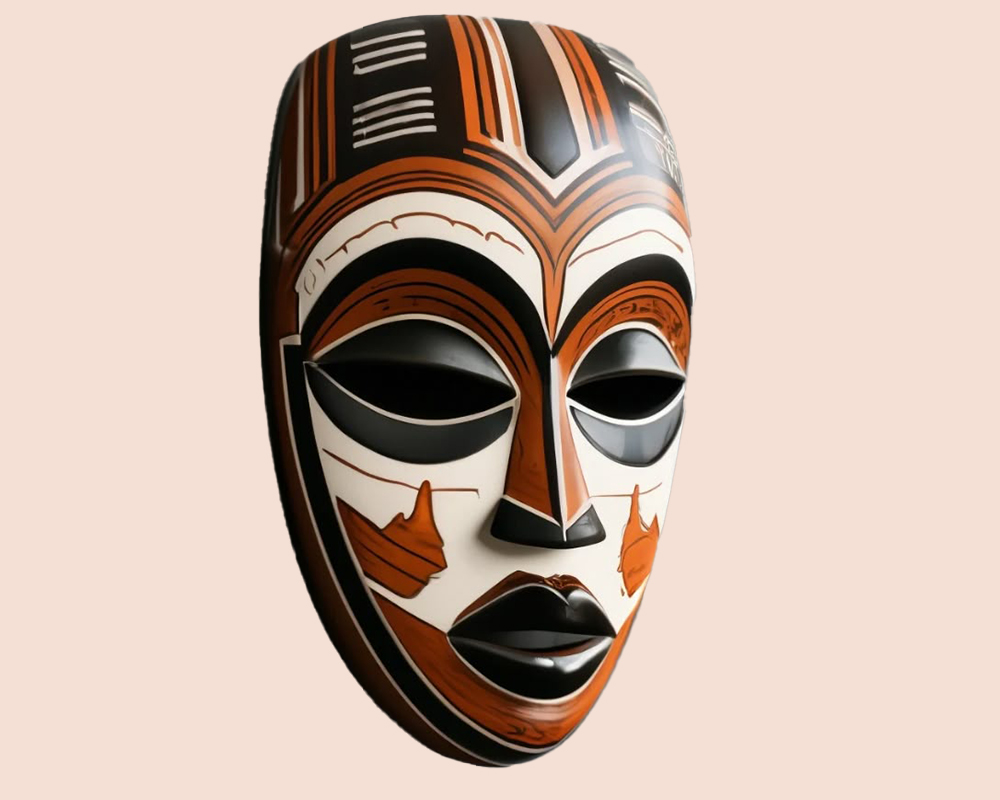The Art of African Mask Making: History, Meaning & Craftsmanship
African masks are more than just decorative pieces; they are sacred artifacts that hold deep spiritual, cultural, and artistic significance. For centuries, different ethnic groups across Africa have used masks in ceremonies, storytelling, and rituals, passing down traditions through generations. In this article, we explore the origins, meanings, and craftsmanship behind African masks.

The Origins of African Mask Making
African masks have been an integral part of cultural traditions for thousands of years, with some dating back to prehistoric times. Used primarily in spiritual and religious ceremonies, these masks are crafted to honor ancestors, embody spirits, or serve as a connection between the living and the divine. Various cultures, such as the Dogon of Mali, the Baule of Côte d'Ivoire, and the Fang of Gabon, have developed distinct mask styles, each carrying its own meaning and purpose.

Symbolism and Meaning Behind African Masks
African masks are deeply symbolic, and their meanings vary by region and function: Spiritual Connection – Some masks are believed to house spirits or gods, used in religious ceremonies to communicate with the divine. Social Identity – Masks represent different social classes, tribes, or secret societies, identifying wearers as members of a particular group. Ritual & Celebration – Used in festivals, initiation ceremonies, and funerals, masks play a key role in storytelling and performance.
The Craftsmanship Behind African Masks
Creating an African mask is a sacred process. Artisans use wood, bronze, fabric, beads, and natural dyes to carve and decorate masks. Traditional methods involve hand-carving with precision, ensuring that every detail holds meaning. Some masks incorporate materials such as feathers, shells, or raffia to add texture and depth.
p>Why African Masks Remain Relevant Today
Despite modernization, African masks continue to be used in traditional ceremonies, and they have also gained recognition in global art and fashion. Many collectors and museums showcase these masterpieces, highlighting their influence on modern art, including the works of Pablo Picasso and Henri Matisse, who drew inspiration from African masks.
Conclusion
African masks are a testament to the continent’s artistic and spiritual legacy. Whether displayed in a museum or worn during a sacred ritual, these masks tell a story of heritage, craftsmanship, and identity. At Nyota Treasures, we offer authentic, hand-carved masks that capture the spirit of African artistry.

Ajia Abdulhamid
"I’ve grown up surrounded by African beadwork, but I never knew how deep the symbolism of colors goes. The article on beadwork was an eye-opener! It’s great to see Nyota Treasures not only selling artifacts but also educating people about their meaning and history. Keep it up!"
Reply
Reuben Omollo
"I visited Kenya last year and was fascinated by the intricate beadwork of the Maasai people. Reading this blog brought back so many memories! I love that you’re not just selling artifacts but also sharing the stories behind them. It makes every piece feel even more special!"
Reply
Kevin Durant
"African art has been a huge inspiration in global design and contemporary art, yet many people don’t realize its true origins. I loved the section on how African masks influenced Western artists like Picasso. This blog is a must-read for anyone passionate about history and art!"
Reply
William Ruto
"I always try to support ethical businesses, but it’s hard to find truly authentic African artifacts outside Africa. This article on ethical shopping really resonated with me. Nyota Treasures seems like the perfect place to buy genuine pieces while supporting artisans directly!"
Reply
Malcom Otieno
"I stumbled upon this website while searching for African textiles, and I’m so glad I did! The blog content is so rich and educational—I’ve learned so much about different cultures and their artistic traditions. I’ll definitely be back to explore more and maybe make a purchase soon!"
Reply
John Doe
Lorem ipsum dolor sit amet, consectetur adipisicing elit. Pariatur quidem laborum necessitatibus, ipsam impedit vitae autem, eum officia, fugiat saepe enim sapiente iste iure! Quam voluptas earum impedit necessitatibus, nihil?
Reply